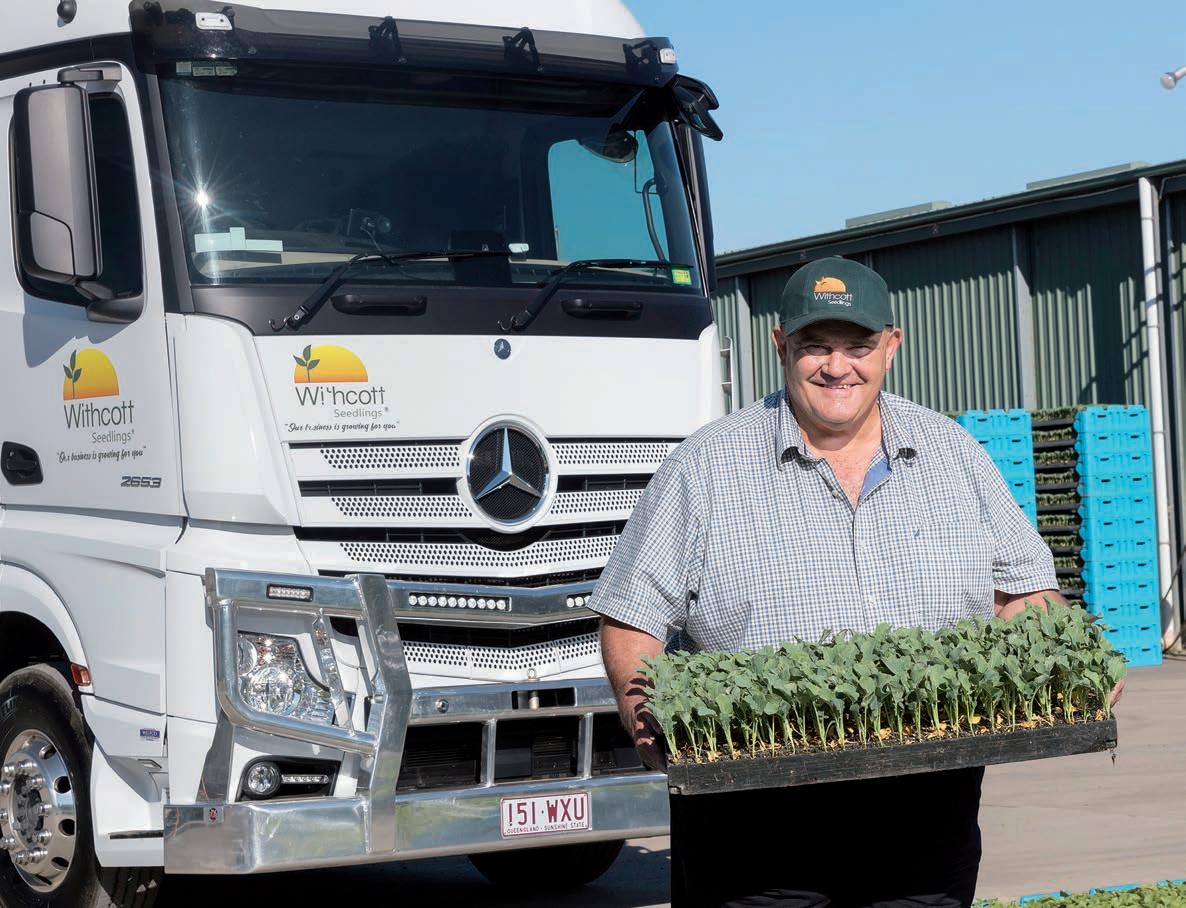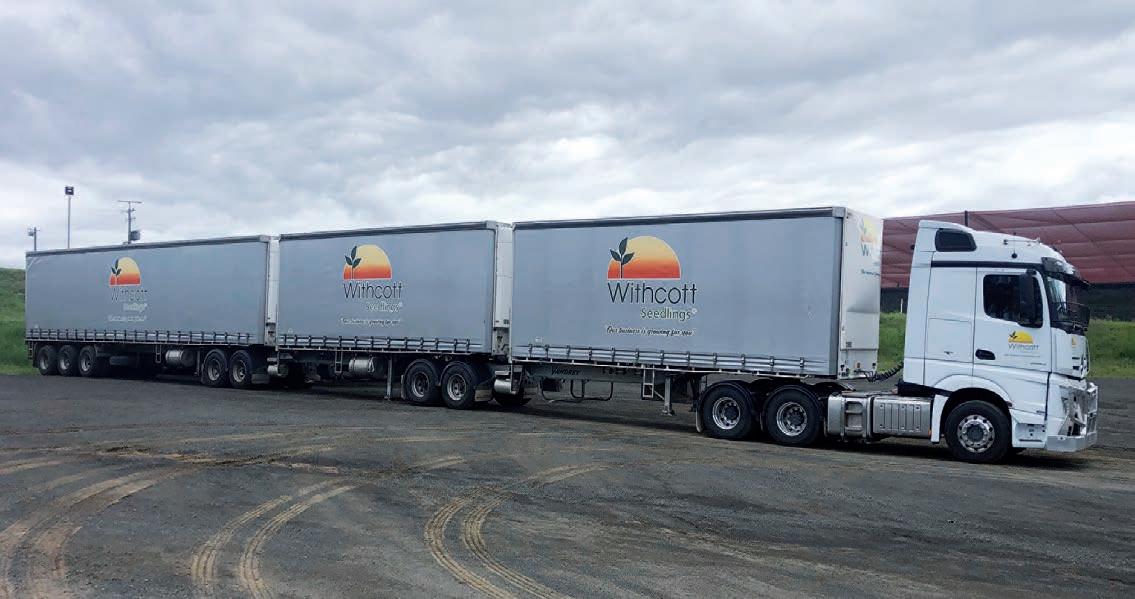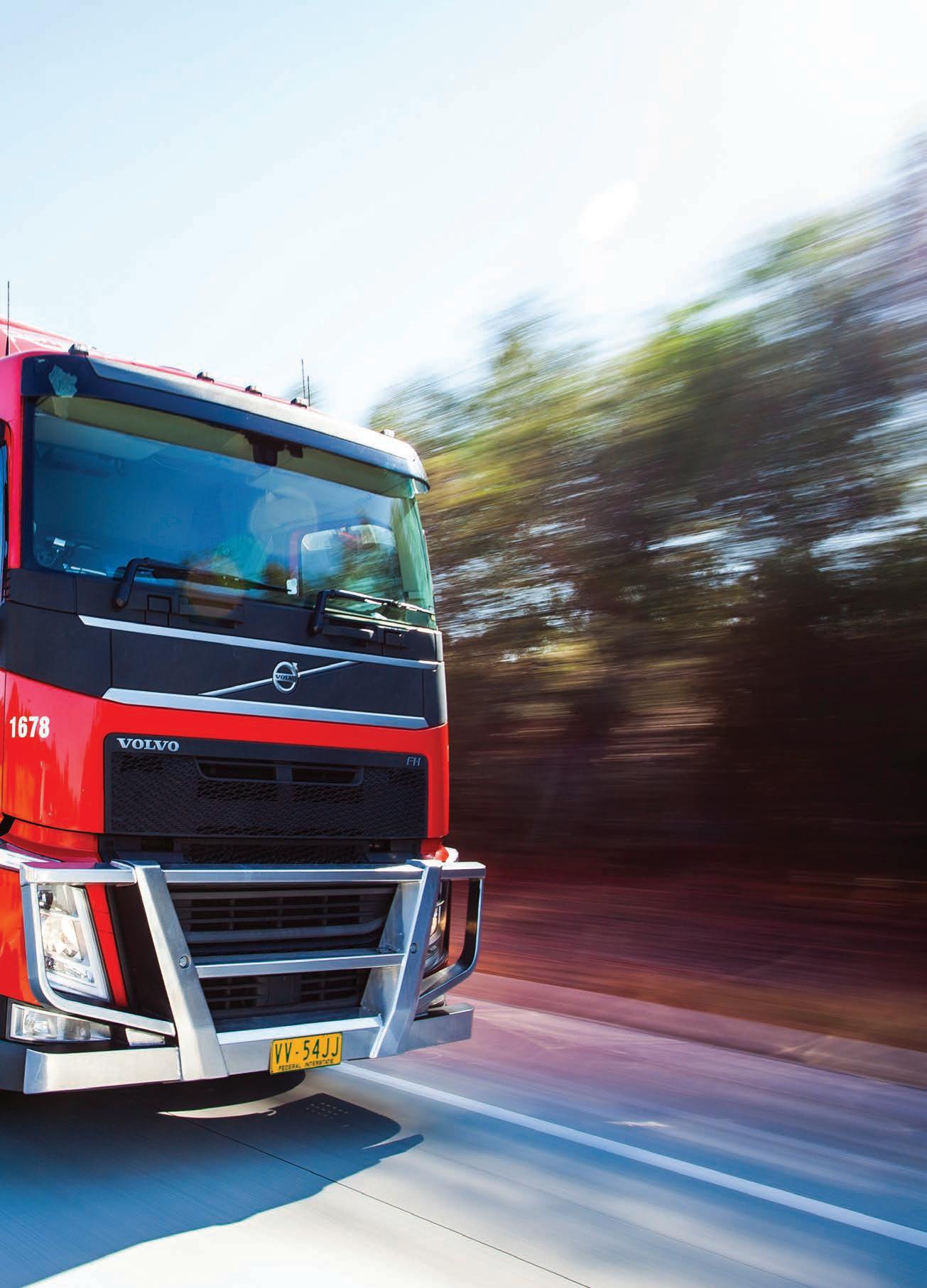
11 minute read
Down to Earth
from Prime Mover May 2020
by Prime Group
Withcott Seedlings B-double combination.
The recent addition of a B-triple combination into its interstate operations suggests Withcott Seedlings is not only growing as a transport operation, but is serious about its core business activity of supplying quality vegetable seedlings into the national horticultural market.

Withcott Seedlings is not a logistics company. It does, however, run an up to date, crack fleet of Mercedes-Benz Actros 2653s out of its nursery at Withcott just east of Toowoomba to agricultural businesses, many of which are based in remote locations, across the eastern seaboard of Australia. While trucking may not be its number one priority, the company is serious about how they distribute their product. In March they introduced a B-triple into its transport operation to maximise truck utilisation and to meet increasing demand from central and southern NSW field growers and glasshouse customers. As seedlings can be classified as fragile and are a perishable product, the handling and delivering of this product is critical according to Withcott Seedlings CEO Mike Hindle. “Trucks are a big part of what we do and how we do it,” he says. “For us the trucks help ensure our product quality is maintained with fast and reliable logistics that can be relied on.” The business has been operating for almost 40 years and not that long ago it was operating body trucks and a couple of single trailers. In the last five years the fleet has rapidly evolved transitioning from semis to B-doubles and now a B-triple. When it came to updating the trucks in 2016, Mike required a support network with reach. Aside from regular weekly trips to destinations such as Sydney, Bowen, Bundaberg,
Griffith, Stanthorpe, Adelaide and local areas in the Lockyer Valley and the Darling Downs, interstate long haul for Withcott Seedlings means going into isolated regional towns throughout the horticultural growing regions of Eastern Australia. Although the weights behind the trucks aren’t excessive at 16 tonnes payload on a B-double, the sheer bulk of deliveries and the requirement of a sleeper cab for the drivers on interstate travel makes it necessary the drivers are comfortable in vehicles with an exceptional safety rating. “It gives us comfort knowing that our drivers are going to be safe and that they can safely operate the truck without too much grief,” Mike says. “The trucks have got to be reliable and they have been. It’s also key that the drivers have got to want to drive the truck. Our core group of drivers love them. One guy has had a bad back for years and ever since he’s been driving the new Actros he says he hasn’t had a twinge. That’s some endorsement. We wanted a truck that would work with our drivers not something they had to battle.” Not wanting for pulling capacity, the Actros delivers 530 horsepower and is ideally suited to augment the application with an extra trailer. The opening of the $1.6 billion Second Range Crossing, which as it so happens, runs by Withcott’s front door, helped trigger the investment in a B-triple combination. The subsequent road classifications that followed freed up large freight movements along the 4-kilometre bypass and Withcott Seedlings was in a enviable position to take advantage of it. Prior to the Second Range Crossing opening roadtrains had to be split up at Toowoomba. Withcott Seedlings now runs the B-triple direct as far as the Victorian border. The productivity gains alone, Mike infers, are already appreciable. At present the B-triple, which mainly operates into Griffith and takes up to 600,000 plants each load, has reduced the use of two smaller vehicle combinations from the task of delivering large quantities of vegetable seedlings. “Our business is continuing to expand,” Mike says. “If we model trips into other destinations on what we already expect to do we can send the B-triple down and be more efficient than using both a B-double and a single trailer. For us it’s about getting a better utilisation out of the prime movers. The other thing, too, is taking the opportunities. Where we can, we will run bigger trucks.” The company has just ordered an additional five trailers to be built by Freighter to facilitate the use of bigger combinations more often. All plants are transported in custom delivery racks and once customers have planted the seedlings the racks then need to be picked up. As the Withcott Seedlings fleet isn’t mobilised for third party freight the return journey is completed with minimal payload. A real, sometimes trivialised consideration for smaller transport operations is the economics of fuel saved when running light though technically, as it is here, not empty. It’s understandable in an industry whose primary objective is delivering on time, at capacity, with as many gains in efficiency as possible. The MercedesBenz Actros on long haul consignment is among, those who use it interstate, an exceptional machine for fuel economy. According to Mike, the Mercedes-Benz Actros 2653s have, to date, delivered, a consistent return of between 38 to 40 litres per 100 kilometres. “Dragging back a B-triple from Griffith the other day, the Mercedes returned fuel economy of 40 litres per 100 kilometres,” he says. “The new trucks when they arrived in 2016 impressed us in terms of fuel burn, which delivered an instantaneous positive impact on the business.” On average the trucks do just over 10,000 kilometres a month. There are nine Mercedes-Benz Actros 2653s in the fleet and the company plans to add an additional prime mover during the winter. Just as the entire fleet was funded through the Mercedes-Benz Agility scheme. Mike says it was crucial to have a guaranteed buy back at the end of service life for the trucks as they are not, unlike some commercial vehicle applications, subject to a constant battering. For the next B-triple combination Mike is considering pairing it with an in-line six cylinder 16 litre engine for its 630 horsepower. Despite already having more than sufficient power, there are other factors in play not in the least the resale value. “In my mind it’s going to have much better resale than the 530 horsepower vehicles we’ve got,” Mike says. “Given our trucks are well looked after and not pummeled over time in grinding applications, they have a good life and have the best chance of holding value.” The trucks, after all, are kept in immaculate condition. Cleanliness not

unlike hygiene, are pillars of the business. Withcott Seedlings prides itself on innovative quality management systems and holds HACCP and ISO 9001 certification as well as organic accreditation. Under the recent COVID-19 guidelines, Withcott Seedlings operates in an area that is deemed an essential industry. “With the office staff on a rotational roster to minimise risk, how we do business has changed significantly and when a meeting is required we now utilise Skype, Zoom or sit around a table under a tree to abide by social distancing laws. It obviously could be worse as being largely an outdoor business does have its advantages in times like these with a global pandemic,” Mike says. “Fortunately, in the realms of the outdoor environment, we made some adjustments so we could better keep people apart. We have a very strong culture of hygiene within the company and these standards have helped implement the changed work practices needed at this time.” At Withcott Seedlings the plants are grown for typically four to five weeks. That’s five weeks less water expenditure and increased land use for its customers, which remains a major consideration for horticultural businesses. Utilising seedling transplants maximises paddock utilisation and significantly improves uniformity of the crops at harvest time. Withcott Seedlings began trading in 1981 and came about principally out of the same necessity of land and water use. Vegetable seedling transplants now are the backbone of the horticultural industry. Mike and his wife Anita, who have been in agriculture all their lives, were both previously agri-business bankers, in part lending money to the horticultural sector. In 2014 Mike and Anita took 50 per cent ownership of the company. Founders Graham and Wendy Erhart own the other half. Water supply is key to the organisation and over 90 per cent of water utilised at the nursery comes from sub artesian bores and is then treated through reverse osmosis plants to ensure purity and consistent quality of the water. In addition, there is approximately 300 megalitres of surface water held on site in dams.

Graham Erhart, Withcott Seedlings Director.

The new B-Triple pulled by a Mercedes-Benz Actros 2653.
Ideally the best growing conditions at the nursery are blue skies with cloudy weather, according to Mike, not conducive to cultivating small plants. “Hot or cold weather is not such an issue as the crops we are growing are timed for that particular seasonal influence,” he says. Rural confidence, helped by widespread seasonal rains earlier this year, has rallied in Queensland with many of the state’s producers expecting a rebound for the agricultural economy according to a quarterly Rabobank Rural Confidence Survey. A total of 57 per cent of Queensland producers indicated optimism in their outlook for the coming year, nearly triple the view held among industry players in 2019. Along with widespread rain events, commodity prices were also identified as a key driver. Mike agrees the prospects are definitely positive compared to 2019. Although he points out much of the rainfall that Brisbane and the Gold Coast received did not filter out to the Lockyer Valley and Stanthorpe as growers still require additional runoff water to top up bores and dams. “In the short term, the issue is understanding our publicly funded irrigation systems in Queensland. It’s way beyond inadequate,” he says. “To have whole areas run out of water
“In the short term, the issue is understanding our publicly funded irrigation systems in Queensland. It’s way beyond inadequate.” Mike Hindle Withcott Seedlings CEO
doesn’t make sense. Lack of water disrupts whole communities and when people leave a small town they just don’t come back. They find better conditions and so the small towns and communities just slowly die over time. The government should be spending a lot more on water infrastructure.” Initiation of effective irrigation schemes in the Lockyer Valley, adequate dam water storage in Stanthorpe and potentially rerouting excess floodwater from north Queensland should all be implemented to maintain a healthy economy and to maintain rural and regional communities according to Mike. The spend required of governments so reluctant to invest in infrastructure that shows long term foresight is another issue altogether he notes. “The Second Range Crossing in Toowoomba was talked about for over 40 years before it finally happened,” he says. “It’s probably one of the greatest things that’s happened to the road system here in a long time.” As the seasons change and winter approaches, Withcott Seedlings, despite the uncertainty of the present moment, will again shift gears and crop types. Grafted watermelons are soon going to be transported to Bowen in north Queensland and Mildura in Victoria. That will be followed by having tomatoes moved into places like Echuca, Swan Hill and Shepparton. These trips will be measured in aggregate and averages of mileage, managed man hours and costs. More importantly, they will need to be completed efficiently and safely. As the magnitude of our national supply chain comes increasingly into focus, the grocery shelves, ever more so, can’t afford to go empty. The longer they do, each transport movement from businesses like Withcott Seedlings takes on greater import. “The Mercedes-Benz is a safe truck that we can standby,” Mike says. “Aside from being a vital part of the business and our customer service, these trucks operate on the front lines of the support network that sustains the country.”

THERE’S NO GREATER INCENTIVE TO SAVE LIVES THAN NOW

Take advantage of instant tax write offs, significant insurance benefits and limited package deals on Guardian, when you install before 30 June 2020.
Guardian’s world leading, real-time driver fatigue, distraction and accident prevention technology, is proven to reduce fatigue events by more than 90%. And now saving lives will save you even more money with extended instant tax write offs offered by the Government’s new stimulus package and great price deals on Guardian. Plus when you install Guardian in your vehicles before 30 June 2020, you’ll also receive these insurance policy benefits and financial incentives:
• No driver restrictions (All driver experience requirements are removed for vehicles with Guardian installed • Excess reduction (Excess for any accidents reduced on vehicles fitted with Guardian by $2,500 – some exceptions apply) • Market value plus (In the event of a total loss of a unit installed with Guardian, settlement can be Market Value plus 20% to a maximum of the sum insured)
• Reinstatement of Guardian hardware (caused by damage in the event of a loss) • Premium adjustments • Guardian 24/7 Service Fee waived for one month • Data feed fee waived for individual data feed from Seeing Machines to NTI • Unique data insights using Guardian and
NTI data to identify and address potential safety risks.
Tax Incentives for businesses with turnover up to $500 million
Under the Government’s new stimulus package, your company may qualify for instant tax asset write-off for Guardian units installed before 30 June. For further information visit ato.gov.au and seek independent financial advice.










